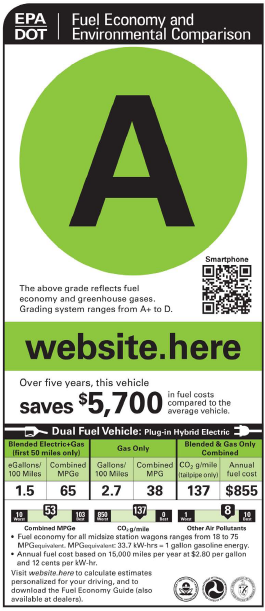 Here’s the cleantech news we’re following today:
Here’s the cleantech news we’re following today:
Fuel economy labels on cars are getting an overhaul in 2012. One proposed sticker would rate cars’ gas mileage on a scale of A+ to D. (What, no F?) The proposed stickers would reflect how electric and hybrid vehicles have altered the standards for fuel efficiency, also providing information on pollutants and greenhouse gas contribution. One possibility includes a smartphone QR Code on the label, which would allow you to access a website on your phone to compare fuel economy ratings. The EPA and DOT posted the labels here, where they’ll remain for 60 days for a mandatory public comment period.
MIT researchers are working on rechargeable fabric batteries, meaning you could theoretically charge your phone by tucking it into your pocket. The technology uses a common, benign virus called M13 bacteriophage that replaces harmful chemicals in battery technology, an example of what researchers call “green chemistry.” Potential uses: soldiers’ uniforms, hiking gear, a lot less crowding around the power outlet at your favorite coffee shops. This comes on the heels of news that you can now charge your iPhone using solar power, thanks to Frostfire’s special case.
Energy distributor Exelon will buy John Deere Renewables, Deere & Co.’s wind energy unit, for $860 million. Exelon, a major energy provider that is also the largest nuclear operator in the U.S., said the deal would add 735 megawatts of green energy to the company’s portfolio. It comprises 36 projects across eight states, or enough power for 160,000 to 220,000 homes. The deal provides for an additional $40 million once construction starts on advanced development projects.
Ford and Portland General Electric (PGE) announced they’ll partner to promote electric vehicles and educate the public about charging needs in the Northwest. They’ll work with local governments to pass incentives for buyers and permit charging stations for electric autos. Ford plug-in and hybrid vehicles started their national tour in Portland last week.
Tesla was fined $275,000 for failing to get a “Certificate of Conformity” for their cars, a requirement placed on all automakers in order to show compliance with the Clean Air Act. The company got one in 2o08, but didn’t do so for 2009 – and had to pay a “civil adiministrative penalty.” No comment from the company.
Colorado solar company Bella Energy is building a $10 million solar energy system that will be the country’s largest rooftop solar array in Salt Lake City. The project measures 600,000 square feet and represents 2.6 megawatts of energy. The construction is financed by NexGen Energy Partners, a renewable energy operator based in Colorado. They’ll sell the power generated back to the county at a fixed rate for the next 20 years.

